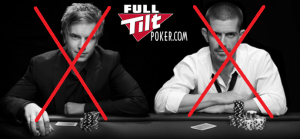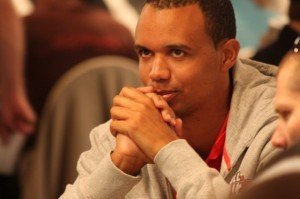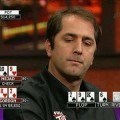
Poker Pros: How the Career Changed in 2014

Viktor Blom and Gus Hansen were among several pros who lost sponsorship deals in 2014. (Image: bankrollup.com)
Poker pros are the sharks amateur players must be aware of, whether in an online cardroom or real life casino.
These men and women dominate the game, and while these all-in masters have existed for decades, the occupation of being a professional poker player has been an ever-evolving concept.
From Johnny Moss to Doyle Brunson, Johnny Chan to Daniel Negreanu, the line of work has changed drastically over the years.
In 2014, playing poker professionally once again transformed to accommodate the game’s current climate. Here’s how:
Sponsorship Terminations
Long gone are the days when a professional player could rely, and possibly fall back on, a substantial sponsorship deal.
This year, notable businesses, networks, and gaming company’s made it apparent that endorsements shouldn’t be taken for granted. The notion of “What have you done for me lately?” became the predominant way of thought for these deals, and it cost many big-name stars their contracts in 2014.
Among those who got a pink slip include:
– Humberto Brenes: Although the former Team PokerStars pro has won over $6 million during his career, he’s struggled since his 2006 WSOP Main Event finish.
– Marcel Luske: His 2003 and 2004 WSOP final table 14th and 10th place finishes remain one of the most impressive feats in poker history, but Luske was cut from PokerStars in 2014. His best finish in the Main Event since: 102nd.
– Viktor Blom: While the young Swede racked up an impressive runner-up finish at the EPT No Limit Hold’em Grand Final in May, Full Tilt dumped Blom’s contract in October.
– Gus Hansen: Like Blom, Hansen was another Full Tilt dumpee who was let go after the poker network said it’s moving away from “pro-centric advertising” to “focus on the experiences and stories of the vast majority of our players.”
– J.C. Tran: Just a year after signing with 888poker following his ’13 WSOP Main Event run, the world’s second biggest cardroom dropped Tran’s sponsorship.
Semi-Pro Expansion
One reason for sponsorships being folded on is likely due to the progression of new amateurs playing online.
As states legalize Internet poker in America, once-casual players are competing more frequently. Tables are running around the clock and around the world, with stakes higher than ever.
As poker hobbyists win a few hands in a row, or possibly even a small-stakes tournament, the thought of going all-in and turning professional becomes not just a dream, but reality.
Today’s leaderboards feature not only professionals who consider it a career, but also participants who have experienced a strong run. This means more “semi-pros” for PokerStars, Full Tilt, and 888poker to choose from for sponsorships.
Legal Troubles

From the courtroom to marijuana, Phil Ivey’s 2014 has been more much than just poker. (Image: michelelewis.com)
With competition more cutthroat than ever, pros have been the focus of several legal investigations as some attempted to maintain a certain level of income in suspect ways.
Phil Ivey’s edge-sorting case against Crockfords Casino didn’t go his way, as London’s High Court ruled against the American pro.
Ivey maintains his innocence in winning $12.5 million in baccarat by determining values by examining flaws in card patterns.
Along with his court case and appeal, Ivey made more headlines when he applied for a medical marijuana license in Las Vegas.
Also in Sin City, Paul Phua’s Caesars Palace sports betting bust by the FBI was controversial, and was a story covered around the world. Phua denied the charges and has pled not guilty.
Archie Karas, the legendary poker player who went on one of the most famous winning streaks ever in the 1990s, avoided jail time in November after he was found guilty of card marking at a San Diego casino.
Although he faced up to three years behind bars, the notorious Karas received only probation.















0 Comments